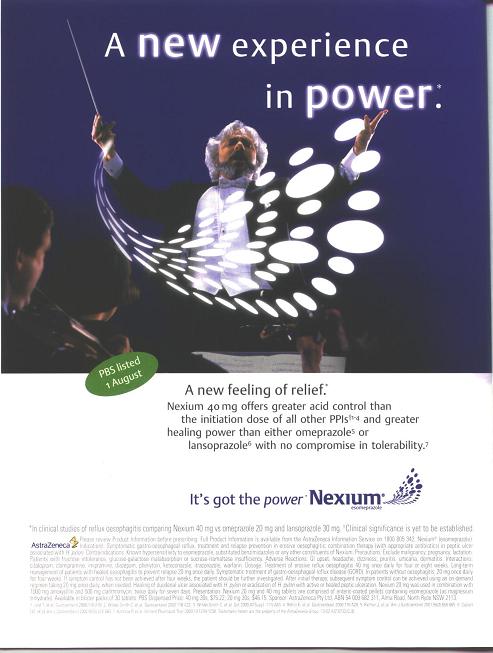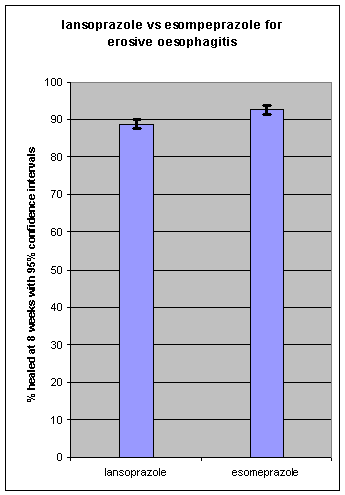Healthy Skepticism International News
June 2003
AdWatch Prototype: Nexium (esomeprazole)
We invite subscribers to comment on our prototype for a new newsletter: AdWatch. AdWatch explains the illogical, psychological and pharmacological tricks used in drug advertisements. AdWatch provides practical recommendations and opportunities for feedback to the AdWatch team and the company responsible for the advertisement.
[Note added on 7 October: See to see the feedback to this edition go to HS Int News August 2003 and to see the results go to AdWatch.]
Nexium (esomeprazole)
“New”
The Headline and Copy (below) appeal to our desire to keep up with new therapies.
Using the word “new” is known to increase the effectiveness of advertising.[1]
Esomeprazole is not new.
Esomeprazole is just a new name for S-omeprazole. (“S” hence “es”.)
Esomeprazole is half of omeprazole (Losec, Acimax).
Omeprazole 20mg contains about 10mg of S-omeprazole and 10mg of its mirror molecule: R-omeprazole.[2]
Omeprazole is a proton pump inhibitor that has been used for years to reduce gastric acidity in the treatment of peptic ulcers and Gastro-Oesophageal Reflux Disease (GORD).

“Power”
The Headline, Picture, Slogan and Copy (above) all appeal to our desire for power.
Such appeals are common in advertising because they work.
These appeals work despite or because we don’t give them much conscious attention.[3]
The claims are based on unfair comparisons.
One of the comparisons was esomeprazole (Nexium) 40mg vs omeprazole 20mg. (This is only disclosed in the fine print.)
It is no surprise that 40mg S-omeprazole in Nexium is more effective than the 10mg of S-omeprazole plus 10mg of R-omeprazole.
Both S and R-omeprazole are converted to the same active metabolite that inhibits production of gastric acid by proton pumps.
R-omeprazole has a lower bioavailability than S-omeprazole and faster clearance, so there may be less R-omeprazole in the blood than S-omeprazole.[4]
However a larger dose of omeprazole would be just as “powerful” as esomeprazole (Nexium) 40mg.
The other comparison was esomeprazole (Nexium) 40mg vs lansoprazole (Zoton) 30mg.
The graph (below) shows that at those doses esomeprazole was more effective but the difference was unlikely to be clinically significant.[5]
If given in the same dose the two drugs may be equally effective or esomeprazole may be less effective.

Surrogate outcomes
The Copy claims “greater acid control” which sounds impressive but the fine print concedes that the “clinical significance is yet to be established”.
There is no evidence that this “greater acid control” leads to any worthwhile clinical advantage for patients.
If there was it would be in the company’s interests to to say so.
Incomplete comparison
Nexium is only compared with other proton pump inhibitors.
Many people with GORD can be adequately treated more cheaply with elevation of the head of the bed plus antacids or H2 antagonists such as ranitidine.
Many people with peptic ulcers are better treated with H. pylori eradication therapy.
Recommendation
There is no proven clinical significant difference between Nexium and equipotent doses of other proton pump inhibitors.
Consequently, when a proton pump inhibitor is appropriate:
*
The best way to choose is on the basis of different prices for equipotent doses.
*
Prescribe which ever is the cheapest at the time in the lowest dose that controls the symptoms.
Feedback
How helpful is the advertisement for Nexium?
extremely helpful
very helpful
somewhat helpful
neutral
somewhat unhelpful
very unhelpful
extremely unhelpful
No opinion
How helpful is this Adwatch edition?
extremely helpful
very helpful
somewhat helpful
neutral
somewhat unhelpful
very unhelpful
extremely unhelpful
No opinion
Any comments for us to send to the company responsible? (Please be polite)
Any comments for the AdWatch team?
Further reading
Do Single Stereoisomer Drugs Provide Value? Therapeutics Letter, issue 45, June-September 2002 www.ti.ubc.ca/pages/letter45.htm
[1] Ogilvy D. Ogilvy on advertising. London Prion 1995
[2] Kale-Pradhan PB, Landry HK, Sypula WT Esomeprazole for acid peptic disorders. Ann Pharmacother 2002 Apr;36(4):655-63
[3] Sutherland M. Advertising and the mind of the consumer. Sydney Allen & Unwin 1993
[4] Andersson T. et al. Pharmacokinetics and pharmacodynamics of esomeprazole, the S-isomer of omeprazole. Aliment Pharmacol Ther 2001; 15:1563-9.
[5] Castell, D. O.; Kahrilas, P. J.; Richter, J. E.; Vakil, N. B.; Johnson, D. A.; Zuckerman, S.; Skammer, W., and Levine, J. G. Esomeprazole (40 mg) compared with lansoprazole (30 mg) in the treatment of erosive esophagitis. Am J Gastroenterol. 2002 Mar; 97(3):575-83.
Page views since 15 March 2010: 14928
Comments
Our members can see and make comments on this page.
















